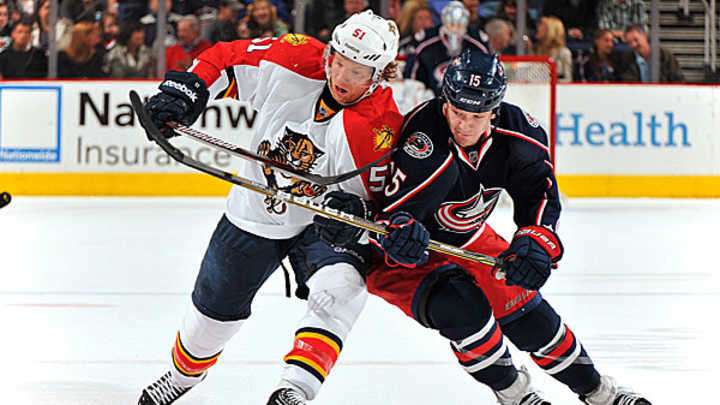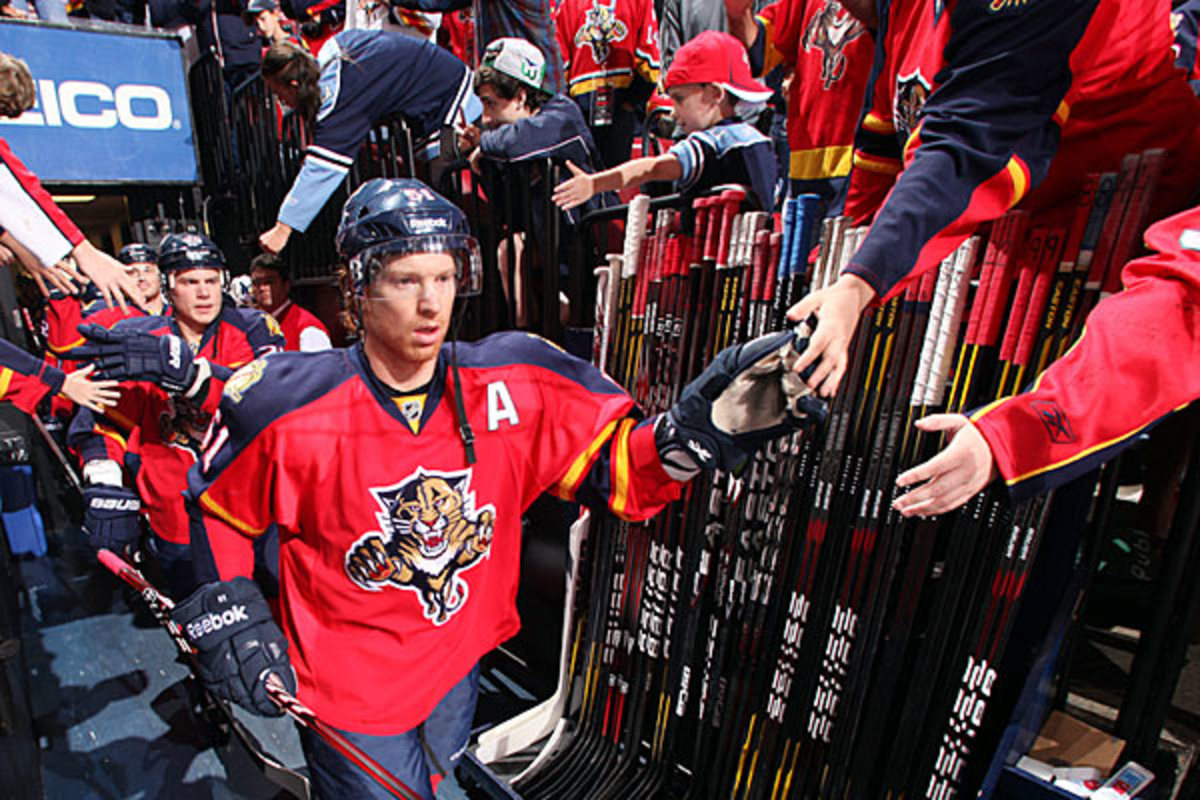How much blame do NHL owners deserve for their economic woes?

Until last season's playoff run, their first berth since 2000, the Panthers were a mediocre to poor club and tough box office sell, factors that have nothing to do with the NHL's expired CBA. (Eliot J. Schechter/NHLI via Getty Images)

By Stu Hackel
On Monday, we looked at Jimmy Devellano's strange remarks about NHL players, who he suggested are viewed by ownership as "cattle." How many owners actually feel that way might be in question, but another of his remarks might be a more accurate representation of this group's sentiment as the lockout continues. "The owners simply aren’t going to let a union push them around," Jimmy D. said. "It’s not going to happen.”
And, apparently, they are going to assert themselves even if it means losing another entire season -- or maybe even two, or however long it takes until they can get the players to yield. When former Florida Panthers executive Stu Siegel writes in this week's issue of Sports Illustrated that he's "depressed" to see another work stoppage and notes "there's plenty of blame to go around," you have to take into consideration that the owners' intransigence is a big component.
That's somewhat problematic if you hold the belief that both sides are going to have to compromise for an agreement to be reached. If moderate voices exist among the owners (and Ted Wyman of The Winnipeg Sun believes there are), they're irrelevant at the moment. Not letting "the union push them around" is tantamount to the owners as a group not backing off from any of their positions in these negotiations. That is, at least, what the players allege is holding things back at the moment. Of course, the league makes the same charge against the players, saying the owners are the ones who have done all the bending on economic issues. The result is we still have no talks scheduled on that front.
From the players' perspective, the owners' stance borders on self-destruction. Blackhawks captain Jonathan Toews, among the most respected leaders in the game, articulated that on Monday after an informal practice by Chicago players. "We saw what the (owners) did in '04-05, and who knows if they're willing to do that again," Toews said (quoted by Chris Kuc of The Chicago Tribune). "To me, it's just carelessness. It's them just trying to show everyone that they're the owners and they're the league. They can do whatever they want. If they want to hurt their own game and drive it into the ground, that's what they'll do. Even if it comes down to that, it doesn't matter as long as they get what they want."
Precisely what they want is now fairly well-known: They want to pay the players quite a bit less than they did under the previous agreement. Ownership's contention is that the economics of the game don't work, even after they overhauled them in the recently expired CBA by locking out the players for a season to achieve a salary cap system that was designed to fix things. If that tactic worked once for them, the owners are prepared to do it again.
But when that system also brings about record revenues and the healthiest state the NHL has ever been in, it's worth asking if the economics are as bad as the owners claim. "I know it's tough to muster sympathy for multimillionaires," Siegel writes, "but when most of these owners say they're losing money every year, they're telling the truth."
As Siegel points out, Forbes magazine listed 18 NHL clubs that lost money last season in their 2012 team valuations while simultaneously pointing out that the game's economics have never been more favorable to the owners. (As a caveat, the NHL has always said the Forbes numbers are not accurate; but they remain the best information we have and constitute legitimate estimated and educated guesses.)
This contradictory situation between record revenue and an allegedly troubled business inevitably raises questions that have made it hard for many fans to comprehend the owners' problem, especially when, as Siegel acknowledges, the owners turn out to be their own worst enemy. "Circumventing the intent of the cap by signing free agents to long, front-loaded contracts that reduce the hit to the club's total cap does them no favors in the p.r. battle when they claim their cash flow is suffering," he writes.
There's no room for argument about this system having shortcomings when a team as seemingly well-run as the San Jose Sharks can't break even and reportedly lost $15 million last season. There are no doubt that a few other franchises are in the same boat. The Penguins, for example, didn't turn a profit in 2010-2011, according to Forbes. Neither did the Ducks or the Blues. These clubs put a decent product on the ice, in some cases they even get fans regularly to fill their the arena and yet they can't help but bleed some red ink. That's a reality the players must face.
But for Siegel or anyone to merely cite the Forbes figures uncritically and out of context misses a big point. A good number of the NHL's money-losing clubs have not been well run or have been uncompetitive and unattractive for too long. If you've been unable to put a good product on the ice for a very long time, that's not necessarily the fault of any system, but of ownership and management. We can start with Siegel's former team, the Panthers, who squandered whatever excitement they built in their early days as a trapping team excelling in a trapping league by missing the playoffs for 10 consecutive seasons until this past campaign and, for many of those years, continuing to put a pretty boring product in their somewhat out-of-the way arena.
Speaking about out-of-the-way arenas, what about the Coyotes, who have lost more money than any NHL club and likely will continue to do so? The league never should have permitted former owner Steve Ellman to forsake a proposed Scottsdale location over a relatively small financial disagreement with that city's government and instead stick the club in Glendale, a place the established fan base in the East Valley has difficulty traveling to even when the team is competitive, which for quite a while it wasn't. Making numerous poor hockey decisions, the Coyotes failed to qualify for the postseason six straight years and seven out of eight prior to their bankruptcy fiasco that ended up with the league owning this money pit of a franchise. That sad tale is well known. It has drained the owners substantially and has nothing to do with any failures of the current economic system.
The Dallas Stars were one of the big Sunbelt success stories until team owner Tom Hicks overextended himself while constructing his sports empire, forcing him into bankruptcy, rendering the Stars unable to maintain their winning ways and souring the fans on him and his hockey team. Can't blame the NHL's economic system for the Stars' losses, can you?
The Kings lost money in 2010-11, before this past Cup-winning season. They'd missed the playoffs for six straight years before a rebuild started to kick in that ultimately paid off with the championship. That kind of long drought dampens fan enthusiasm for the product and hurts the bottom line. It's too bad, but it's not the fault of the league's economics when clubs become chronic losers.
How about the Islanders? That team is still reeling under string of poor decisions made by their hockey department coming out of the lockout in 1994, a succession of terrible trades and silly signings that torpedoed a once mighty and beloved franchise on the ice and alienated a once-loyal fan base in the process. You can add poor ownership (and even fraudulent ownership, in the case of John Spano) to the poor management here as well as the inability to solve an arena problem that continues to drag on and fuel talk of relocation. No one can blame the NHL's economics for that mess.
What about the Devils? Here's a team in North America's most populous region, an established hockey area, that has never done any sort of creative marketing or promotion whatsoever and regularly had trouble getting fans into their new arena until they made a deep playoff run this past season. Is the NHL's economic system at fault for that?
Columbus? Badly managed from Day 1, they've been unable to build a winner other than for one season out of 11 -- and when they finally got a decent coach, Ken Hitchcock, and made the playoffs, they dismissed him when the team slumped the following year. After splurging on questionable acquisitions last summer, they flopped again and a small group of fans even staged a protest against the current regime last season. Sorry, but their plight has less to do with the failures of NHL economics than the failures of their hockey department.
Then there's the poor Nashville Predators who finally built a good team, attracted committed ownership, and pledged to their growing fan base that they'd finally start to retain their best players rather than continually lose them to free agency. What happens? Other clubs raid them anyway, making pitches for their two best defensemen, one of the raiders being the cash-poor Minnesota Wild who snared Ryan Suter. The ultra- rich Philadelphia Flyers' outrageously structured RFA offer sheet to Shea Weber forced Nashville to match and, in doing so, probably fated the Preds to red ink for the foreseeable future. That is the NHL's system and it was exploited by one of league's the most powerful owners who was preying on a club struggling to find its feet. It's hard to have sympathy with the owners' plight when they pillage each other in this fashion.
The point here is that the owner's portrayal of the NHL's economic landscape is more complicated than the picture some like to paint of it. They want the players to make sacrifices in the next CBA to correct flaws from the last one, but in a good number of instances, the fiscal problems some teams have experienced have little to do with the way the old CBA worked. In some very significant cases, it comes down to the owners hoping they can force someone else to repair their own train wrecks and they seem to be willing to sacrifice a season or more to accomplish that.
COMMENTING GUIDELINES: We encourage engaging, diverse and meaningful commentary and hope you will join the discussion. We also encourage, but do not require, that you use your real name. Please keep comments on-topic and relevant to the original post. To foster healthy discussion, we will review all comments BEFORE they are posted. We expect a basic level of civility toward each other and the subjects of this blog. Disagreements are fine, but mutual respect is a must. Comments will not be approved if they contain profanity (including the use of abbreviations and punctuation marks instead of letters); any abusive language or personal attacks including insults, name-calling, threats, harassment, libel and slander; hateful, racist, sexist, religious or ethnically offensive language; or efforts to promote commercial products or solicitations of any kind, including links that drive traffic to your own website. Flagrant or repeat offenders run the risk of being banned from commenting.
